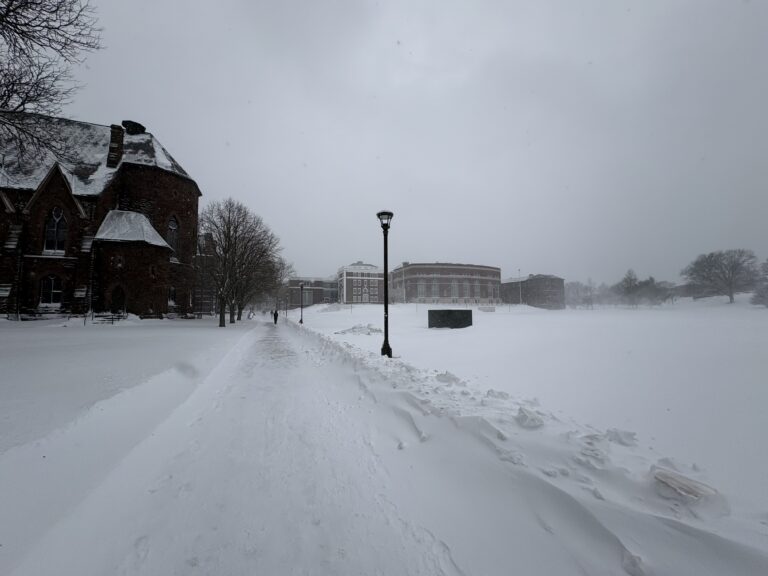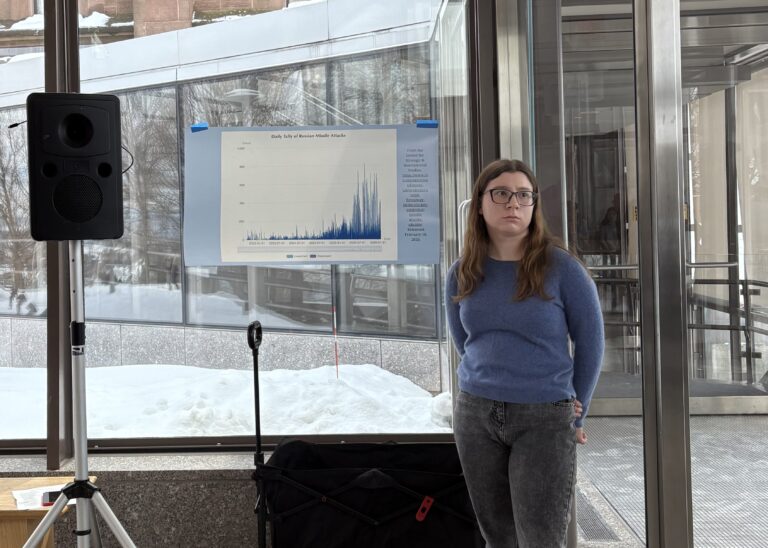University Jewish Community Joins Open Hillel Movement
The University Jewish community recently announced its support of the Open Hillel movement, which is devoted to abolishing the guidelines regarding Israel-related protocols within the Hillel International (Hillel) organization. The official regulations of Hillel reject partnerships with speakers or groups that deny the right of Israel to exist as a Jewish state.
Though the Jewish community on campus is student-run, it is considered a Hillel Programming Center (HPC) and has a partnership with the organization’s center in Washington, D.C.
Earlier this month, students at the Swarthmore College Hillel became the first chapter of the organization to declare itself an Open Hillel, refusing to abide by the current guidelines.
“Open Hillel is a student-run campaign to encourage inclusivity and open discourse at campus Hillels,” the Open Hillel website reads. “We seek to change the ‘standards for partnership’ in Hillel International’s guidelines, which exclude certain groups from Hillel based on their political views on Israel. In addition, we encourage local campus Hillels to adopt policies that are more open and inclusive than Hillel International’s, and that allow for free discourse on all subjects within the Hillel community.”
The movement received support from members of the Jewish community on campus.
“It is sort of a no-brainer for me that any Jewish community, particularly on a college campus, should be open to discussion of whatever issues are relevant and important to the people involved,” said Bayit House Manager Talia Baurer ’15. “[This is] about allowing people to express a variety of political opinions in a space and a community that I strongly believe should be available to any sort of connection people may have. I was really excited to hear that people in the Wesleyan Jewish Community who are involved in campus conversations about Israel [and] Palestine chose to write this letter [to join Open Hillel], and after reading it I was so happy to sign.”
J Street U Co-Chair Maya Berkman ’16 explained that the movement has been gaining traction over the years.
“One thing that is unique about Wesleyan is that we have been able to have these conversations and these dialogues,” Berkman said. “We felt that as we were reading about this movement, students deserved to be trusted with their own voices. So then we started circulating the petition.”
Danny Blinderman ’14, another J Street U Co-Chair and an organizer of the Open Hillel movement at the University, agreed, adding that the given guidelines hinder speech, isolate students, and preclude people from accessing the full breadth of the intellectual and ideological alternatives that are present on college campuses.
Examples of such censorship include an incident at Harvard University, when the Hillel there was banned from co-sponsoring a discussion with a Palestinian student group.
“I thought it was important for Wesleyan to join the Open Hillel movement primarily as a way to stand in solidarity with those who share our values,” Blinderman said. “We have an incredibly open and pluralistic community at our campus…. However, at other campus communities, people are not always afforded the opportunity to exercise these values. I felt that it was important to let the Jewish community and the wider world know that these are our values and we support those who are trying to live them out on their respective campuses.”
Jacob Seltzer ’17, a member of J Street U, added that this move has implications for Hillel-oriented college campuses around the country.
“The move shows that campuses no longer need to abide by Hillel guidelines that are dictated by donors,” Seltzer said. “Fortunately at Wesleyan, we already had an inclusive environment for a diverse array of voices in the Jewish community ,so our decision to join the Open Hillel movement was completely symbolic.”
Students involved in the Jewish community believe that this petition is showing support to the movement of an “Open Hillel” as a whole.
“We are entirely in line with what the [Open Hillel] movement is standing for,” Berkman said. “Hillel is a very valuable and important body on many college campuses. But, if they are adhering to guidelines listed [as missions] then there needs to be room for students to have their own dialogues.”
Berkman added that the talks have shown that students are able to cope with challenging topics.
“A big concern is fostering positive sentiments,” Berkman said. “The problem is, people won’t necessarily shy away from Israel or Zionism if they are limited. Even if they do, they need to be trusted to do it themselves…. The point is, [either students] will or will not come to a conclusion, but regardless it will be their own decision to do so.”
Baurer added that she is aware that her views on Israel and Palestine are not identical to the views of everyone who has signed the petition; rather, those who signed the Open Hillel concur that the community must be open to the debate and various opinions on all issues that are imperative in the Jewish community.
“Being pro-Israel and being Jewish do not have to coincide…and in the end, that is what Open Hillel is addressing,” Baurer said. “For me, criticizing Israeli policies and violations is actually an important part of my deep connection to Judaism. The individuals and organizations who equate being pro-Palestine, anti-Israel, and/or anti-Zionist with being an anti-Semite exclude Jews like me from their narrow definition of ‘Jewish.’”
Blinderman noted that the launch of the movement should not have much impact on campus life.
“Not a whole lot is changing on campus,” Blinderman said. “I will say generally that a student who wishes to engage with the Jewish community but is told that he or she must be silent on the issue of Israel cannot help but feel alienated and excluded from that community. My view is that if we believe passionately that there is more than one way to talk to God, then we should admit that there is more than one way to talk about Israel and the people who live there.”







I feel sorry for you when I read your so called moderation. With due respect, you have the typical historical Jewish minority, “PLEASE LIKE ME” complex and it is so pitiful to read.
Throughout Jewish History especially in Nazi Germany there were those Jews who begged to be accepted and liked by the host country’s people. “Like me and I will eat ham for you on Yom Kippur. Like me and I will put up a Christmas tree and call it a Hanukah Bush, like me and I will only pray one day a week, Sunday if you wish (the early German Reformed Jews), etc.” The first Jews to be gassed by Hitler were those Reformers (“please like me…”) who were viewed as a major threat by Hitler and his Jew hating Nazis.
Fast forward to today: Here you are apologizing for Israel who is expected to live a double standard. Never mind the rockets and atrocities implemented by the Palestine people. If you read your history parts of Jordan are supposed to include part of Palestine–the world has convenient amnesia with this one. In the meantime here you are with your “please like me” attitude and no matter what you do they are NOT going to like you. You can stand on your head, eat ham and cheese sandwiches and they are still going to hate you because you are a Jew, period!
Look in the mirror and accept that you are a Jew. Say it to yourself over and over and perhaps YOU can accept YOURSELF.
Remember, if Israel disappears (the Jewish Host country)
there IS NO place for American Jews or the World Jewish community to go in the event of another pogrom, anti-Semitic uprising or Holocaust. If there is
another anti-Semitic uprising you are a Jew to these people no matter how much you apologize or try to appease them.
“I cannot accept that we are a race,” Herzl wrote. “We are an historical entity … No nation has uniformity of race.”
http://www.thetablet.co.uk/books/10/1441/herzl-theodor-herzl-and-the-foundation-of-the-jewish-state
The building is the old Commons Club, which before that was Sigma Chi. I lived there in 1964-65 as a member of Commons Club. Commons Club had become a local fraternity in 1961, when the Sigma Chi national declined to repeal its whites only clause.
I am trying to see a parallel between between leaving whites only Sigma Chi and becoming part of Open Hillel. There is a superficial continuity but the differences. keep coming to mind. First, we left Sigma Chi completely. No foot in each camp. Second, we were clear that our values and the values of Sigma Chi national were completely inconsistent. I sense ambiguity (or maybe even obfuscation) in the current split. Do you or do you not think that Israel has a right to exist as a Jewish state? All the rhetoric about being silenced obscures the answer to that question. As I understand it, Hillel does not try to silence anyone. You can say and believe what you want. Hillel simply does not want to have an institutional link with persons or organizations that want Israel to cease to exist.
A big difference of course was that we were not going to go to war with Sigma Chi, nor they with us. Nuclear weapons were not involved.
My suggestion is that at one of your earliest public discussions, you focus on the underlying question. Should Israel retain the right to exist as a Jewish state.
And then the subsidiary questions. If Israel, either intrinsically or because of its national conduct, should be deprived of its right to exist as a Jewish state, who should take action to make that happen? What would that action be? What would be the personal consequences to Jews in Israel, and Jews everywhere?
And if Israel does have the right to exist as a Jewish state, how does it secure that right? Who should assist Israel in securing the right, and what form should the assistance take? What should be done with those individuals or nations who would forcibly deprive Israel of nationhood?
But those issues can’t be addressed coherently until you face and answer the underlying question. Does Israel have a right to continue to exist as a Jewish state?
A lot of the discussion surrounding this is fruitless because of a failure to face that question honestly.
“It is sort of a no-brainer for me that any Jewish community, particularly on a college campus, should be open to discussion of whatever issues” Yes, but a thoughtful and considered use of the brain would show that Hillel must not be used as a platform for Christian proselytizing, incitement to violence, racism, or anti-Semitism – even when anti-Semitic views are promoted by well meaning Jewish anti-Zionists.